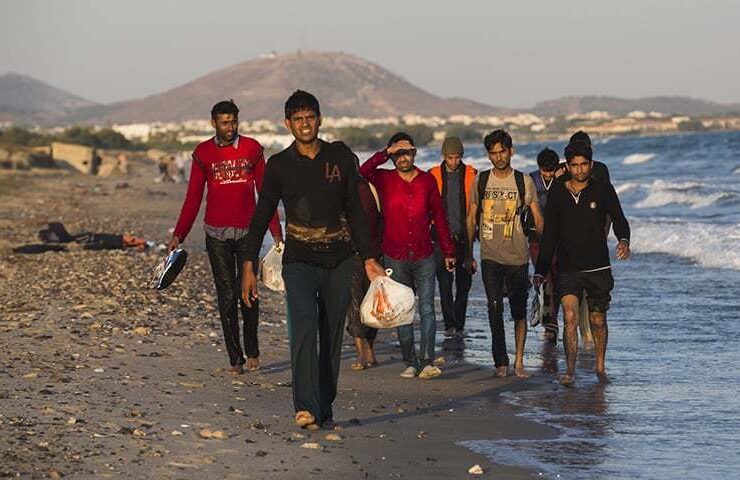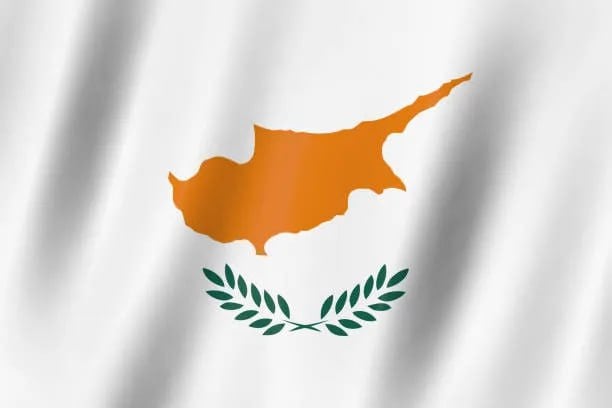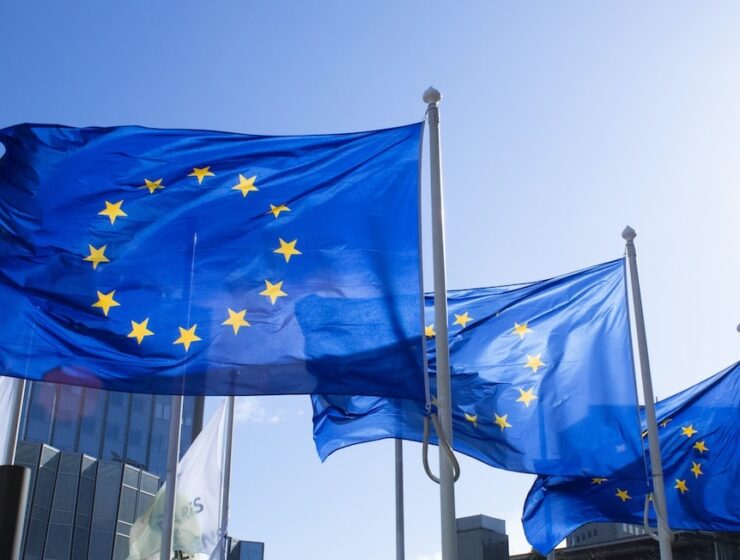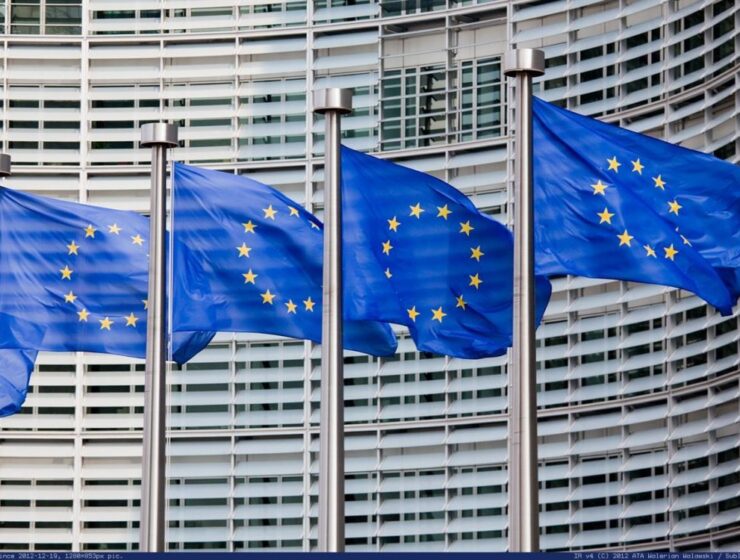Greece’s Independent Public Revenue Authority (AADE) has intercepted a shipment of 963 kilograms of smuggled…
Tag: border control
Children born in the UK to illegal migrants and failed asylum seekers will be deported with their parents under sweeping new rules announced by Home Secretary Shabana Mahmood to remove “perverse incentives” for having kids to block removal.
Greece is among the latest European countries introducing stricter measures on migration. Britain proposed sweeping…
Aphrodite Latinopoulou called Zohran Mamdani’s New York mayoral win “a black day for the West,” claiming the left now relies on Islamism and illegal immigrants for votes after the collapse of the woke agenda.
Starting October 12, 2025, Australians traveling to the Schengen Area must comply with the new digital Entry and Exit System (EES), providing fingerprints, photos, and questionnaire answers at borders to create a biometric recor
Greek Migration Minister Thanos Plevris defended a new migration bill in Parliament, rejecting claims that migration could solve Greece’s demographic crisis. In a heated speech, he criticized leftist parties for supporting open-border policies, stating, “There are borders, and they are guarded.” Plevris emphasized stricter controls, legal migration pathways, and tougher return measures, arguing that unchecked migration threatens Europe’s identity. He also introduced administrative detention for undocumented migrants and electronic monitoring for rejected asylum seekers.
President Donald Trump landed in Scotland and warned that mass migration is “killing Europe,”
Greece’s tough policies under Minister Thanos Plevris, who has blocked migrants from Libya with strict deportations and jail terms.
He also criticized windfarms for ruining Europe’s landscapes.
Greece introduced a stringent migration bill at an EU meeting in Copenhagen, proposing prison sentences, restricted benefits, and electronic monitoring for irregular migrants, aiming to deter unlawful migration and bolster EU border security.
The European Commission proposes tripling the ETIAS entry fee for non-EU travelers to €20, citing inflation and operational costs. The new fee, pending EU Council and Parliament approval, aligns with UK and US standards and will support enhanced security measures.
The UN Refugee Agency (UNHCR) has expressed concern over a proposed Greek law that would temporarily suspend asylum applications from boat arrivals, warning it could violate international and European legal standards. Amid rising arrivals on Gavdos and Crete, UNHCR urged Greece to uphold its tradition of refugee protection and called for greater EU solidarity with frontline states.
Migration and Asylum Minister Thanos Plevris announced new “disincentive” measures to curb migrant arrivals in Greece, including mandatory detention, a review of asylum seeker benefits, and criminalizing overstays after asylum rejection, following a surge in arrivals from North Africa.
Greek Prime Minister Kyriakos Mitsotakis is set to announce tougher immigration measures in Parliament today, signaling a sharp shift in policy amid rising migrant arrivals from Libya. The new approach includes a “return or prison” ultimatum for those denied asylum, with the government pledging strict enforcement and no tolerance for irregular migration, especially during the peak tourist season.
Libya’s interim government estimates 3-4 million illegal migrants are in the country and is fighting human trafficking gangs. Following a meeting with EU officials, including Greece’s Thanos Plevris, Prime Minister Abdul Hamid Dbeibah announced plans for a comprehensive migration strategy and a formal EU agreement to enhance border control and stability.
The EU’s border agency, Frontex, is reviewing 12 serious incident reports involving Greece, some linked to alleged illegal pushbacks of migrants—a practice recently condemned by the European Court of Human Rights. While Greece denies such actions, the investigation underscores ongoing concerns about border management and human rights compliance at Europe’s southeastern frontier.
Greek MEP Afrodite Latinopoulou ignited debate at the European Parliament, condemning illegal immigration and the Islamization of Europe while urging mass deportations and support for frontline nations like Greece. Her provocative speech, which accused EU leaders of enabling crime and ghettoization, drew both support and criticism, highlighting deep divisions on immigration policy.
The Greek island of Gavdos experienced an unprecedented surge in migrant arrivals on February 27, 2025, with seven separate landings occurring in a single day. Approximately 350 individuals, all young men, either reached the island’s shores or were rescued by the Hellenic Coast Guard. Authorities coordinated efforts to transport the migrants to Crete, highlighting the growing pressures on Greek border control and humanitarian response efforts as Mediterranean migration continues at a steady pace.
The European Union is planning a major overhaul of the 1951 Refugee Convention, potentially allowing member states to deport failed asylum seekers and criminals. This move, driven by the belief that the post-war agreement is outdated, could drastically change European migration policy and spark debate over human rights protections.
Cyprus aims to join the Schengen Area by the end of 2025, enabling visa-free travel with 29 European countries. This move promises to boost tourism, trade, and mobility for Cypriots, but the island nation faces unique challenges related to its divided status and geographic isolation.
Greek authorities arrested 124 migrants on Karpathos Island after unmarked boats were spotted near the coast. The rise in illegal migration, attributed to ongoing conflicts in the Middle East, has led to a nearly 50% increase in arrivals, with Syrians making up the largest group.
New travel requirements are coming for non-EU citizens visiting Europe. The Entry/Exit System (EES) and European Travel Information and Authorisation System (ETIAS) will introduce biometric registration and travel authorizations for short stays. These changes will affect UK passport holders and other visa-exempt travelers, impacting border procedures and potentially creating longer wait times. Learn more about these upcoming changes and how they might impact your European travel plans.
Bulgaria marked its entry into the Schengen Area with ceremonies at its borders with Greece and Romania. Prime Minister Dimitar Glavchev symbolically raised the border barrier at the Kulata-Greece crossing, while Interior Minister Atanas Ilkov joined his Romanian counterpart at the Danube Bridge to celebrate the free movement now possible between the countries.
The United Nations refugee agency has expressed deep concern over a recent surge in migrant deaths in Greek waters. This week alone, two fatal shipwrecks claimed the lives of multiple individuals attempting to reach Greece by sea from Turkey in small boats.
Romania and Bulgaria are poised to join the Schengen Area by January 2025, streamlining travel across Europe. This expansion promises simplified border crossing, increased tourism, and stronger trade ties, benefiting both travelers and the travel industry.
As Middle East conflicts raise concerns about increased migration, Greece is urging the EU to adopt stricter migration policies. Migration Minister Nikos Panagiotopoulos announced plans for new detention centres on Rhodes and Crete, as sea arrivals have doubled. With migrant facilities nearing capacity, Greece seeks enhanced border controls and deportation measures within the EU’s recently approved Migration and Asylum Pact.
A disturbing TikTok video posted by a coach driver has revealed the dangerous lengths migrants will go to in an attempt to enter Greece illegally. The footage, filmed in Istanbul, shows two individuals wedged in the luggage compartment of the coach, struggling to escape the cramped space. The driver notes that such incidents are becoming increasingly common, raising serious concerns about the pressures on the Greek-Turkish border and the need for enhanced border controls and regulations to ensure the safety of travelers.
Europe has made a decision… that it is not possible for traffickers to determine who will join the European Union… Our argument will only be complete if we say that we determine who wants to join the European Union, but whoever cannot and does not have a place in Europe because they are not entitled to asylum, must return to the country of origin,” Mitsotakis emphasized.
EU leaders have called for new legislation to “increase and speed up” migrant returns from the bloc, urging action from the European Commission as a matter of urgency following a summit in Brussels.
Irregular border crossings into the European Union have decreased by 42% since the beginning of the year, driven by significant drops along the Western Balkan and Central Mediterranean routes. However, crossings from Africa have doubled and nearly tripled into Poland from the EU’s eastern border, highlighting shifting migration patterns.
From November 2024, the new EU Entry/Exit System (EES) will start for all non-EU nationals, including British nationals, travelling in or out of the Schengen area. The Schengen area is made up of 29 European countries, 25 of which are EU Member States. The EES is a digital border system which registers non-EU visitors travelling into the Schengen area instead of stamping their passports.
Starting November 10, 2024, the European Union will introduce the automated Entry/Exit System (EES), replacing traditional passport stamps with biometric data recording. This significant shift aims to enhance border security and streamline the travel experience, while marking the end of a nostalgic era for passport stamp collectors.






























